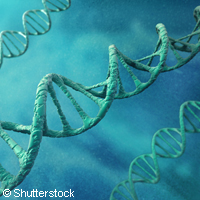Scientists discover new gene involved in cancer
European scientists have discovered a new gene that plays a key role in protecting the body against cancer. The findings, published in the journal Molecular Cell, shed new light on how cancers arise and could eventually lead to new treatments against the disease. Gene p53 is the subject of intense investigations by cancer researchers; when a cell's DNA is damaged, p53 produces a protein that makes sure that the cell either repairs the damage or commits suicide. However, if the p53 gene is itself damaged, these impaired cells may multiply unchecked, leading to cancer. In fact damage to p53 is implicated in around half of all tumours, making it the most common mutated gene in human cancer. However, in many tumours the p53 gene appears to be perfectly healthy, leading the researchers to speculate that in these cases, p53's function must be impaired via some other mechanism. In this latest study, researchers from Spain and Sweden identified a new gene, which they call Wrap53, that appears to regulate the activity of p53. According to the scientists, Wrap53 produces a molecule of 'antisense RNA' which is needed for the production of the p53 protein. Crucially, if Wrap53 is blocked, the production of p53 is suppressed. In other words, damage to Wrap53 could cause cancer indirectly by preventing production of the p53 protein. 'Mutations in the p53 gene contribute to about half of all cancer cases,' commented Marianne Farnebo of the Karolinska Institute in Sweden. 'In the remaining half, p53 is probably inactivated in other ways, such as damage to Wrap53 knocking out the production of the p53 protein.' The researchers suggest that the status of Wrap53 be analysed in tumour biopsies. 'It is clear that Wrap53 adds another level of complexity to the regulation of p53,' the scientists conclude. 'Further studies of Wrap53 may provide a more complete understanding of the regulation of p53 in various physiological processes as well as during tumour development and may eventually also open avenues for therapeutic intervention in cancer.' The research also adds to our understanding of how antisense RNA regulates the activity of genes. In this case, Wrap53 appears to influence the production of the p53 protein by interacting with the p53 mRNA (messenger RNA). mRNA represents an intermediate stage in protein production. When the interaction between Wrap53 and p53 mRNA was blocked, the production of the p53 protein was stopped. 'At least 20 per cent of all genes can be regulated by antisense RNA, making it a potentially very common control mechanism,' said Dr Farnebo. 'But it's been difficult to show that antisense RNA really does serve important functions in the body, as we've managed to do in this study.'
Countries
Spain, Sweden



